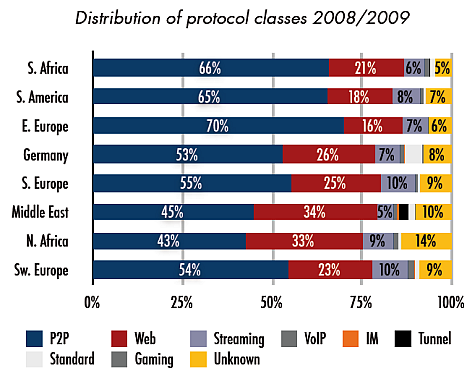A decline in P2P-sharing
I just read an article on Tweakers that Ipoque, a German company that sells ‘deep packet inspection-hardware’, has published a study on the distribution of protocol classes. This chart is a representation of their findings.
With the ‘deep packet inpection-hardware’ internet Providers can analyse internet traffic. This hardware also enables providers to regulate the traffic by providing the ability to filtering and prioritize certain protocols. As a result, P2P-traffic is declining. Be that as it may, more interesting to me is the fact that Tweakers mentions the decline of P2P over the ‘normal’ web traffic. I think we could better speak of P2P-traffic as being the norm because of its hegemony. Anyway, the regional coverage of the study has been extended to include eight regions of the world, namely: Australia, Eastern Europe, Germany, the Middle East and Southern Europe, Northern and Southern Africa, South America and Southern Europe. The data that has been analyzed is of one provider/region. The amount of users per region differs between 50.000 and 250.000.
Here are some of the key findings of the study summed up. (published by here):
- P2P generates most traffic in all regions
- The proportion of P2P traffic has decreased BitTorrent is still number one of all protocols, HTTP second.
- The proportion of eDonkey is much lower than last year.
- File hosting has considerably grown in popularity.
- Streaming is taking over P2P users for video content
- Usenet, a file sharing alternative for P2P, appears in the statistics for the first time
Would the decline of (war on) P2P-traffic be a result of the ‘creative property’-right lobbyists?
Would this decline worsen the ability to get a hold on ‘creative property’ from of which we get inspired to create our own?
Would this be the end of ‘free culture’?
